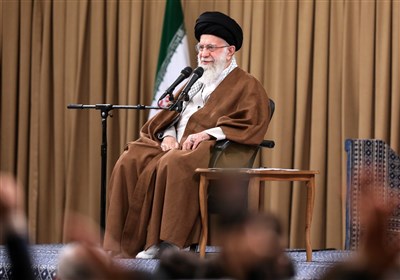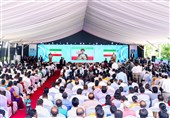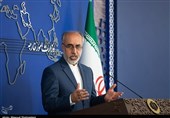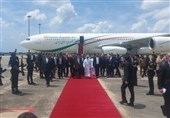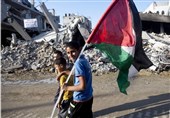Spokesperson: Iran’s N. Negotiators in Close Coordination with Supreme Leader
TEHRAN (Tasnim) – Iran’s recent three-stage plan on its nuclear program to the six major world powers in Geneva was proposed in coordination with the country’s high-ranking officials, particularly the Supreme Leader, foreign ministry spokeswoman stated.
“The talks between the Islamic Republic of Iran and G5+1 (the five permanent UN Security Council members plus Germany) is carried out in constant coordination with the country’s senior officials, and the president is liaising with the Supreme Leader on the issue,” said Foreign Ministry Spokeswoman Marziyeh Afkham on Tuesday.
She told reporters in her weekly press conference that all the major frameworks and policies are decided on in the country's Supreme National Security Council.
Tehran and the Group 5+1 held a two-day meeting in the Swiss city of Geneva on October 15-16. During the two-day talks, Iran presented a three-step plan with the aim of bringing the standoff over the Islamic Republic’s peaceful nuclear program to an end.
According to Iran’s foreign ministry official, the plan called "An End to the Unnecessary Crisis and a Beginning for Fresh Horizons" had many new ideas and the capacity to make a breakthrough in the standoff between the two sides.
The two sides, however, agreed to keep the details of the proposal confidential.
Iran's Deputy Foreign Minister and senior negotiator in talks with the world powers Seyed Abbas Araqchi also described the fatwa of Iran's Leader as one of the cornerstones of the country's proposal to the G5+1.
Araqchi outlined the general features of the proposal as the following: First, using the Supreme Leader’s fatwa as the most important step; second, commitment from the G5+1 to recognize Iran’s right to enrich uranium and enjoy nuclear facilities, including research reactors; and third, peaceful nuclear cooperation between the two sides, transparency and supervision of the International Atomic Energy Agency (IAEA), and lifting all the anti-Iran sanctions imposed by the UN Security Council.
In 2005, Supreme Leader of the Islamic Revolution Ayatollah Seyed Ali Khamenei issued a fatwa forbidding the production, stockpiling and use of nuclear weapons.
Iran, one of the original states to sign the Non-proliferation Treaty, completed its Safeguards Agreement with the IAEA in 1974. Areas covered include the application and implementation of safeguards, materials control, provision of information to the IAEA, and the non-application of safeguards to nuclear material to be used in non-peaceful activities.

